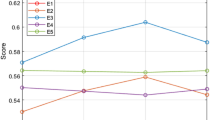Abstract
Intuitionistic fuzzy (IF) point operators transform an intuitionistic fuzzy set to a fuzzy set, or an intuitionistic fuzzy set with a smaller degree of hesitance. The purpose of which is to empower the operations of intuitionistic fuzzy sets with traditional fuzzy set methodologies. In the present paper, a new IF point operator is proposed. Different from the existing IF point operators, the new approach includes two parametric functions with respect to the number of iterations. It is proved that the newly proposed method could be degenerated to the traditional IF point operators. Meanwhile, the new IF point operator can extend our horizons in the exploration of the relationship between fuzzy sets and intuitionistic fuzzy sets. Specifically, a special case of the new IF point operator would be entitled as the memoryless multi-stage voting method, with which the decision makers are assumed to be affected only by the outcomes of the latest round of voting. It is proved that the memoryless multi-stage voting method converges to the limit produced by the infinite number of iterations much faster than the traditional voting method. Furthermore, a numerical example is employed to demonstrate the validity and performance of the memoryless multi-stage voting approach.


Similar content being viewed by others
References
Atanassov, K. (1986). Intuitionistic fuzzy sets. Fuzzy Sets and Systems, 20, 87–96.
Burillo, P., & Bustince, H. (1996). Construction theorems for intuitionistic fuzzy sets. Fuzzy Sets and Systems, 84, 271–281.
Chen, S., & Hwang, C. (1992). Fuzzy multiple attributes decision making: Methods and applications. Berlin: Springer.
Chen, T. Y. (2015). IVIF-PROMETHEE outranking methods for multiple criteria decision analysis based on interval-valued intuitionistic fuzzy sets. Fuzzy Optimization and Decision Making, 14, 173–198.
Dubois, D., & Prade, H. (1980). Fuzzy sets and systems: Theory and applications. New York: Academic Press.
Gou, X., & Xu, Z. (2016). Exponential operations for intuitionistic fuzzy numbers and interval numbers in multi-attribute decision making. Fuzzy Optimization and Decision Making. doi:10.1007/s10700-016-9243-y.
Li, D. F. (2005). Multiattribute decision making models and methods using intuitionistic fuzzy sets. Journal of Computer and System Sciences, 70, 73–85.
Li, D. F. (2011). Extension principles for interval-valued intuitionistic fuzzy sets and algebraic operations. Fuzzy Optimization and Decision Making, 10, 45–58.
Li, P. K., & Fang, S. C. (2009). A survey on fuzzy relational equations, part I: Classification and solvability. Fuzzy Optimization and Decision Making, 8, 179–229.
Lin, L., Yuan, X. H., & Xia, Z. Q. (2007). Multicriteria fuzzy decision-making methods based on intuitionistic fuzzy sets. Journal of Computer and System Sciences, 73(1), 84–88.
Liu, H., & Wang, G. (2007). Multicriteria decision-making methods based on intuitionistic fuzy sets. European Journal of Operational Research, 179, 220–233.
Meng, F., & Chen, X. (2016). Entropy and similarity measure for Atannasovs interval-valued intuitionistic fuzzy sets and their application. Fuzzy Optimization and Decision Making, 15, 75–101.
Park, J. H., Cho, H. J., & Kwun, Y. C. (2011). Extension of the VIKOR method for group decision making with interval-valued intuitionistic fuzzy information. Fuzzy Optimization and Decision Making, 10, 233–253.
Pei, Z. (2013). Rational decision making models with incomplete weight information for production line assessment. Information Sciences, 222, 696–716.
Pei, Z., & Zheng, L. (2012). A novel approach to multi-attribute decision making based on intuitionistic fuzzy sets. Expert Systems with Applications, 39(3), 2560–2566.
Szmidt, E., & Kacprzyk, J. (2000). Distances between intuitionistic fuzzy sets. Fuzzy Sets and Systems, 114, 505–518.
Tan, C., Jiang, Z. Z., Chen, X., et al. (2015). Atanassov’s intuitionistic fuzzy Quasi-Choquet geometric operators and their applications to multicriteria decision making. Fuzzy Optimization and Decision Making, 14, 139–172.
Wan, S.P., Wang, F., & Xu, G., et al. (2016). An intuitionistic fuzzy programming method for group decision making with interval-valued fuzzy preference relations. Fuzzy Optimization and Decision Making. doi:10.1007/s10700-016-9250-z.
Wang, J. C., & Chen, T. Y. (2015). Likelihood-based assignment methods for multiple criteria decision analysis based on interval-valued intuitionistic fuzzy sets. Fuzzy Optimization and Decision Making, 14(4), 425–457.
Wang, X., & Kerre, E. E. (2001a). Reasonable properties for the ordering of fuzzy quantities (I). Fuzzy Sets and Systems, 118(3), 375–385.
Wang, X., & Kerre, E. E. (2001b). Reasonable properties for the ordering of fuzzy quantities (II). Fuzzy Sets and Systems, 118(3), 387–405.
Wang, Z., Li, K., & Wang, W. (2009). An approach to multiattribute decision making with interval-valued intuitionistic fuzzy assessments and incomplete weights. Information Sciemces, 179, 3026–3040.
Wang, Z. J. (2015). Geometric consistency based interval weight elicitation from intuitionistic preference relations using logarithmic least square optimization. Fuzzy Optimization and Decision Making, 14, 289–310.
Xu, Z. S. (2007). Intuitionistic fuzzy aggregation operators. IEEE Transactions on Fuzzy Systems, 15, 1179–1187.
Xu, Z. S., & Cai, X. (2010). Recent advances in intuitionistic fuzzy information aggregation. Fuzzy Optimization and Decision Making, 9, 359–381.
Xu, Z. S., & Yager, R. R. (2008). Dynamic intuitionistic fuzzy multi-attribute decision making. International Journal of Approximate Reasoning, 48, 246–262.
Xu, Z. S., & Yager, R. R. (2006). Some geometric aggregation operators based on intuitionistic fuzzy environment. International Journal of General Systems, 35, 417–433.
Ye, J. (2009). Multicriteria fuzzy decision-making method based on a novel accuracy function under interval-valued intuitionistic fuzzy environment. Expert Systems with Applications, 36(3), 6899–6902.
Ye, J. (2010). Using an improved measure function of vague sets for multicriteria fuzzy decision-making. Expert Systems with Applications, 37(6), 4706–4709.
Zhang, X., & Xu, Z. (2012). A new method for ranking intuitionistic fuzzy values and its application in multi-attribute decision making. Fuzzy Optimization and Decision Making, 11, 135–146.
Acknowledgements
The author is grateful for the financial support partly from the NSF Project (No. 51305400) of China, and from the NSF Project (No. LQ12G01008) of Zhejiang Province.
Author information
Authors and Affiliations
Corresponding author
Rights and permissions
About this article
Cite this article
Pei, Z. Multi-attribute decision making based on a novel IF point operator. Fuzzy Optim Decis Making 16, 505–524 (2017). https://doi.org/10.1007/s10700-016-9255-7
Published:
Issue Date:
DOI: https://doi.org/10.1007/s10700-016-9255-7




